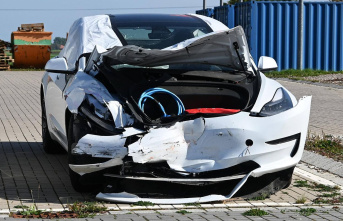Germany's largest trade union with 2.15 million members is undergoing restructuring. IG Metall is discussing a new management structure after a renewed decline in members last year. The desired dual leadership with two equal chairmen is established in political parties such as the SPD, the Greens or the Left Party.
The previous deputy chairwoman Christiane Benner is willing to continue to assume management responsibility in a duo. "If I couldn't imagine it, I wouldn't promote it," said the 54-year-old in Frankfurt when asked a question. As things stand, the Stuttgart district chief and collective bargaining expert Roman Zitzelsberger could be elected Benner's co-chairman in the fall.
So far, the statutes of IG Metall have distinguished between the first and second chairmen. On the other hand, the laws are unwritten that the first chairman as the "IG Metall boss" strongly represents the union to the outside world and that the second chairman or the second chairman comes to the top of the organization if the first resigns. This has been the norm up to now, even when there were sharp ideological differences between the protagonists, as in the case of Jürgen Peters and Berthold Huber in 2003, the rule was always observed.
The IG Metall is facing the personnel issue, because the 67-year-old first chairman Jörg Hofmann will not appear again at the union convention in October. The sociologist Benner wants to be the first woman in the history of the male-dominated trade union to run for the top metal job and has already turned down the DGB chair that has been offered to her. Hofmann announced a personal tableau by the summer. The committees are also currently discussing the possible restructuring of the Management Board.
At his last annual press conference, Hofmann initially reported a moderate decline in membership of around one percent. For the third Corona year in a row, IG Metall was unable to compensate for resignations and deaths, but in the second half of the year during the collective bargaining round in the metal and electrical industry, it gained more new members than it had in years.
Hofmann: "We still have a lot of potential"
"It is not a law of nature that IG Metall loses members because of demographic change," said Hofmann. "We already have a very good degree of organization, but we still have a lot of potential." The resources will be used in a targeted manner where people could be recruited.
Funds are still sufficiently available, as Treasurer Jürgen Kerner made clear. At EUR 596 million, membership income exceeded the previous year by around EUR 4 million, but did not reach the mark from the record year 2019 (EUR 598 million). Among other things, EUR 215 million of the income flowed into the local offices and EUR 89 million into reserves. "No strike will fail because of money," said Kerner.
Politically, IG Metall wants to use the year 2023 to organize the socio-ecological change fairly for the employees. "We have to shape the transformation in such a way that the potential of skilled workers is not lost in companies today. Despite the sometimes dramatically changing activities, we need secure perspectives in the working world of tomorrow," said Hofmann, who also clearly criticized the lack of vocational training practiced. In terms of industrial policy, IG Metall wants to put a brake on prices for industrial electricity so that companies can remain competitive.







